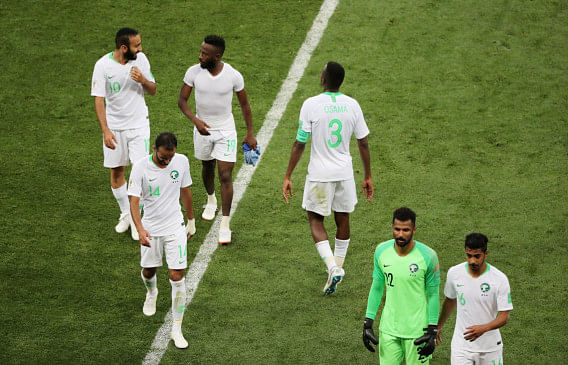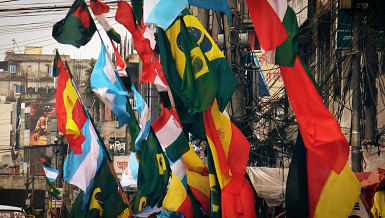No-one expected Egypt, Morocco or Saudi Arabia to win the World Cup but for all three to crash out on the same day was a disaster for Arab football.
Between them they have so far mustered no points, the tournament's biggest thrashing and just one goal -- and that was a penalty.
The only Arab team now with any hope is Tunisia, and they face the task of trying to beat a Belgium side who some tip to win the World Cup, after losing 2-1 to England in their first game.
Reaction was swift across the football-mad region after the losses on Wednesday.
Many fans took to social media to joke that they now knew what FIFA stood for -- "Football Is not For Arabs".
Others claimed that "Arab teams were years behind Europe and Latin America".
Another drily noted: "Arab countries always differ in everything but agree to leave the World Cup together."
Saudi Arabia were the most disappointed. They were thumped 5-0 by Russia and then lost 1-0 to an unconvincing Uruguay.
Saudi's Argentinian coach Juan Antonio Pizzi was asked by journalists why the team had failed to make Saudi Arabian fans "proud" of their team.
Turki al-Sheikh, the Saudi Arabian sports authority chief, lashed out at the players after the Russia debacle in a Twitter video, claiming the performance was a personal insult.
"We've done everything we could for the national team players," he thundered, before adding: "They've blackened my face."
Egypt's tournament has been a fairytale turned horror story with the injury saga of their key player Mohamed Salah, whereas Morocco played well against Iran and Portugal but were toothless in attack.
- Extra scrutiny -
Teams from the region were hardly alone in experiencing disappointment, but their failure in Russia is especially relevant because the 2022 World Cup will be held in the Middle East for the first time and the performance of Arab sides will be closely scrutinised.
The host nation, Qatar, has never qualified for the finals, a fact often pointed out by its many critics -- it will get a free ticket in 2022 in return for organising the event.
Russia defied pre-tournament expectations that they would flop on home soil, but some have predicted that Qatar will make history in 2022 by becoming the first host team to lose their opening game.
Since controversially winning the right to host the tournament, Qatar has said its World Cup would be one for the whole region, a legacy now under risk.
The tournament could have a different flavour to any before with the vast majority of the 1.5 million fans expected to attend coming from the Middle East region, particularly the Gulf.
But an increasingly poisonous political dispute between Qatar and its rivals, including Saudi and Egypt, threatens that.
Saudis, and others from the region, are now banned from travelling to Qatar.
In 2026 in North America, the first 48-team World Cup, there will be potentially more Arab teams than ever before.
Sides such as Saudi qualify for the World Cup via the Asian Football Confederation and Morocco, Egypt and Tunisia via the Confederation of African Football -- an Egyptian fan explained that in football, they are "Arab first, Africans second".
In eight years' time, the AFC and the CAF will have 17 teams at the finals, instead of the nine at present.
A similar poor performance in 2026 as in Russia is sure to lead to other federations questioning why these nations have so many World Cup spots.
So despite the pride in Arab teams qualifying for Russia, for now there is disappointment and bitter recriminations.
As one fan tweeted: "We (Arabs) have to be honest, we don't deserve to play in big tournaments."




 For all latest news, follow The Daily Star's Google News channel.
For all latest news, follow The Daily Star's Google News channel. 









Leave your comments